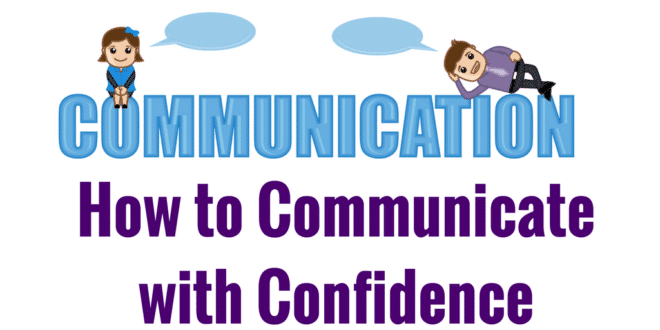Communication is something we have to do every day with a variety of people, both those we are comfortable with, and those who intimidate us. The conversation we have with them can also be planned or unplanned, but regardless of the timing, the people, and the location, there are ways to communicate with confidence.
Who Are You When You’re Confident?
Does this question leave you a little flustered? To some, the idea might seem difficult. They’ll answer immediately, “I’m not confident” and may have trouble even remembering a time they were confident. You might be bothered by the question, especially if you’re not sure why confidence should matter.
If that’s the case for you, perhaps it’s time to take a closer look at confidence itself. You might not have a clear understanding of just what it is or why it’s essential.
What is Confidence?
When you think of someone confident, what do you see? You probably see someone with a particular set of traits including several, if not all the items from this list:
- They have an absolute, set belief in themselves
- They consider themselves capable of handling the situation they’re in
- They expect success when they begin a new task
- When they speak, they mean what they say
- They hold themselves in a way that looks natural but full of strength
- They seem comfortable in their skin
- At the same time, they’re not overbearing or cocky in their attitude
- They take risks
- They don’t miss out on fresh opportunities
In all of this, you’ll find one thing linking all these traits: this feeling of confidence comes from inside the individual, not outside.
There is nothing in this world that can make you confident… but you.
Our definition then becomes straightforward: Confidence is a belief you hold inside of yourself. It tells you that you can handle whatever comes your way. This feeling is so strong it translates into a sureness of yourself even in new or challenging situations.
The critical thing to remember is this kind of feeling doesn’t come without merit. This has to be a genuine assurance, born of a realistic understanding of what you’re capable of. Confidence is most reliable when it’s built out of self-awareness and experience.
Communication is something we have to do every day with a variety of people, both those we are comfortable with, and those who intimidate us. The conversation we have with them can also be planned or unplanned, but regardless of the timing, the people, and the location, there are ways to communicate with confidence. Here are a few simple tips for conversing with others confidently.
How to Communicate with Confidence
Here are a few simple tips for conversing with others confidently.
Make Eye Contact
Eye contact shows you are interested, engaged, and no afraid of the other person. Eye contact can become a little bit of a science to understand with precision because too little or too much eye contact is not good either—you’ll have to gauge how much you and the other person are comfortable with.
Maintain Good Posture
If you’re standing or sitting with strong posture, you effuse a sense of strength and imbue your words with confidence, while slouching or poor posture (mainly if you’re drawn inward towards your lap) can indicate weakness and insecurity. Stand or sit with your back comfortably straight, and hold your hands in your lap or at your sides.
Read more => Good Posture : How to Develop Good Posture
Avoid Nervous Gestures
Pay attention to the things you might do if you’re nervous, such as touching your nose, fidgeting with something, or playing with your hair in your hands like keys or a phone. Avoid these gestures, as they can communicate a lack of interest or fear of engagement.
Don’t Use Filler Words
If possible, try to avoid using words like “um” and…” and.” These are words that we typically use in everyday conversation, but when you’re uncomfortable, shy, or unsure of what to say next, you might find yourself using these words or sounds more often.
Be Assertive
Practice saying what you need to say in a polite but clear way. Don’t let other people push you over, and don’t be afraid to say what needs to be said—as long as it’s polite and reasonable. If you have trouble doing this, try practicing with someone you trust like a friend or relative.
Breathe
Don’t forget to breathe, especially since breath can help regulate your feelings and reactions. If you feel yourself getting panicky about a specific interaction, drop your thoughts and assumptions on how it will turn out and focus on the sound of your breath. Once you’re centered, you’ll be ready to interact with a higher degree and communicate with confidence
Liked this article? Share it to say “thanks!” Your support is much appreciated!
I would love to connect with you!
You can find me on TWITTER1, TWITER2, INSTAGRAM FACEBOOK, PINTEREST, or GOOGLE+
LEAVE YOUR COMMENTS/VIEWS BELOW


